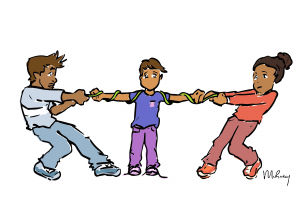Dear Teen and Parent,
Death of a loved one, be it a family member or friend, can leave you in a world of grief. It’s a process you will have to go through in your own way and in your own time. You cannot bring them back, or change what has happened. So what can you do? As you travel along the grief process path, if you can allow yourself to reflect on what that person has meant to you, and how they have impacted your life, you may be able to find something positive in the loss. What I mean is…think about how that person positively impacted your life. Maybe by always being there for you, making you laugh, loving you, supporting you in a crisis, being a great listener, someone fun to hang with, being a great friend, or someone you looked up to. Take that memory and quality about that person and think about how you can apply it to your own life. How can what that person gave you make you a better person? How can you be more like them or have more of that quality that meant so much to you? By becoming a better person, because of what they gave you, you are honoring that person’s life. Anytime we can be better people we will be affecting the world around us in a positive way. So let yourself reflect on the memories you are left with, laugh about the good times and funny moments, and let yourself take on a new view of who you are and who you can become by having been touched by the person you lost. What a great honor.

